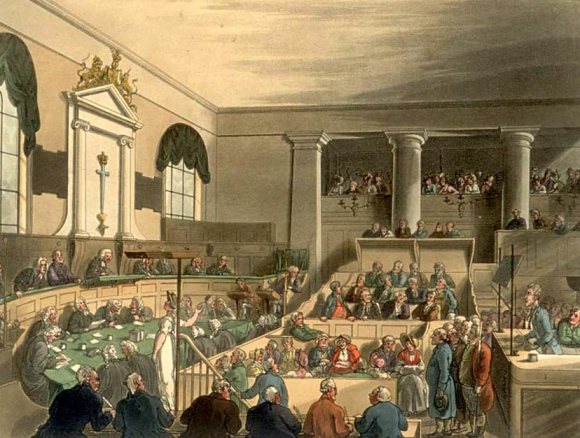By Benjamin Newman and Hannah Awcock

The International Conference of Historical Geographers took place from the 5th to the 10th of July at the Royal Geographical Society (with IBG) in Kensington (Photo: Ben Newman).
As the International Conference of Historical Geographers drew to a close, amidst bids from St Petersburg and Warsaw to host the next meeting of the conference, Innes Keighren took to twitter to write that it was:
https://twitter.com/inneskeighren/status/619566844635127808
This, of course, was true in every respect. Over the previous six days, historical geographers from around the globe had come together in a frenzy of papers, plenaries, field-trips, lunches, dinners and a general hum of enthusiasm for historical geography. There was more to celebrate than just a successful conference with ICHG observing its 40th anniversary, and it was on that subject that Alan Baker (University of Cambridge) was invited to give the first plenary talk of the conference on the opening Sunday inside The Royal Geographical Society (with IBG)’s Ondaatje Theatre. His plenary would serve both as a celebration of the evolution of the meeting of British and Canadian Historical Geographers in Kingston, Ontario 40 years previous, and also as a reminder of the barriers to participation in historical geography, both at the conference and in the Journal of Historical Geography. His talk and invited contributions from international scholars left much to muse over at the welcome drinks reception that followed.

Professor Catherine Hall gave an excellent plenary about British slave-owners (Photo: Hannah Awcock)
Monday would see the conference officially begin with eleven parallel sessions offering a feast of historical geography for delegates to enjoy. It would be difficult to summarise the diversity of the contributions, from urban historical geography, feminist historical geography, and GIS, to historical geography of extreme weather, war, knowledge, instruments, books, architecture, photography and many more. As the full first day of the conference drew to a close delegates excitedly gathered in the Ondaatje Theatre to listen to the first of three evening plenary sessions. UCL-based Professor Catherine Hall spoke to the title: Rethinking Slavery and Freedom. Professor Hall took a novel approach to slavery, focusing on the slave-owners rather than the slaves themselves. Thinking about how slave-owners constructed their world and justified their ownership of human beings allows us to put slavery back into British history.
Tuesday would be another busy day of all things historical geography, with Landscape Surgery’s first speaker, David Rooney. He got the Surgeons off to a good start with a paper on ‘Technologies of Segregation on the Streets of East London.’ He would be the first of a large number of Surgeons who participated in the conference, with Liz Haines, Noeme Santana, Hannah Awcock, Bergit Arends, Bethan Bide, Janet Owen, Innes M. Keighren, and Veronica della Dora, all involved in either convening, speaking, or both. And of course our own Felix Driver was Chair of the local organizing committee! Tuesday’s plenary was a landmark session with Felix chairing the inaugural British Academy Lecture in Geography, welcoming Bill Cronon (University of Wisconsin-Madison) to talk under the provocative title: Who reads Geography or History Anymore? The Challenges of Audience in a Digital Age. His talk discussed the death of the book length monograph, reading practices in the digital age and challenged the academy to consider the potential of various non-traditional outputs.
Conference delegates may have embraced Bill Cronon’s calls for academics to engage with social media a little too enthusiastically with the appearance of the @Geographyfly twitter account. The tweets were supposedly by a fly who liked to participate in proceedings by crawling around on the projector in the Ondaatje Theatre during plenary sessions. There was a certain amount of ‘buzz’ about who the genuine culprit was.
On Wednesday there was a break from formal sessions for a series of field trips. A series of 17 trips, ranging from the historical geography of hop picking in Kent to a musical tour of Soho, proved that historical geographers do far more than just sitting in the archive. Surgeon Innes Keighren was one of the organisers of a trip to Maritime Greenwich. We both thoroughly enjoyed our field trips, and the general consensus was they were all well organised and informative.

The field trip to the site of the 1862 Great Exhibition also included a tour of the Albert memorial in Hyde Park (Photo: Ruth Mason).
Thursday’s tube strike—minus some sore feet from walks across London—did little to dampen the atmosphere as parallel sessions kicked off again after Wednesday’s hiatus. That evening the final plenary of the conference was given by Professor Simon Schaffer (University of Cambridge), on the topic of ‘Astronomy at the Imperial Meridian: The Colonial Production of Hybrid Spaces.’ It is of note that none of the plenary speakers (apart from Alan Baker) identify as historical geographers, which reflects the truly interdisciplinary nature of the subject. In the opening plenary on Sunday evening Professor Mona Domosh (Dartmouth College) had suggested that maybe it doesn’t matter so much whether scholars call themselves historical geographers. Rather, what matters more is that people are doing historical geography in new and interesting ways, and after attending the ICHG it would be very hard to argue that it is anything less than a vibrant and dynamic discipline.
On Friday morning the finish line of this six-day marathon was in sight, but sessions continued unabated. The conference drew to a close with delegates choosing the hosts of the next ICHG. We would personally like to thank the Local Organising Committee and the RGS-IBG for doing such an excellent job of organizing and running the conference, and then all that remains is to say see you in Warsaw in 2018!
by Benjamin Newman and Hannah Awcock.






